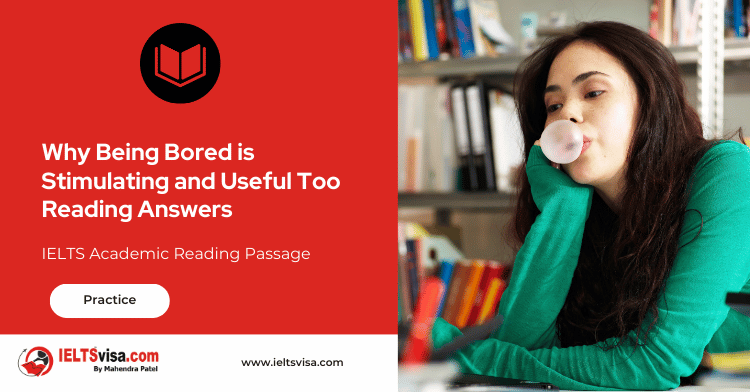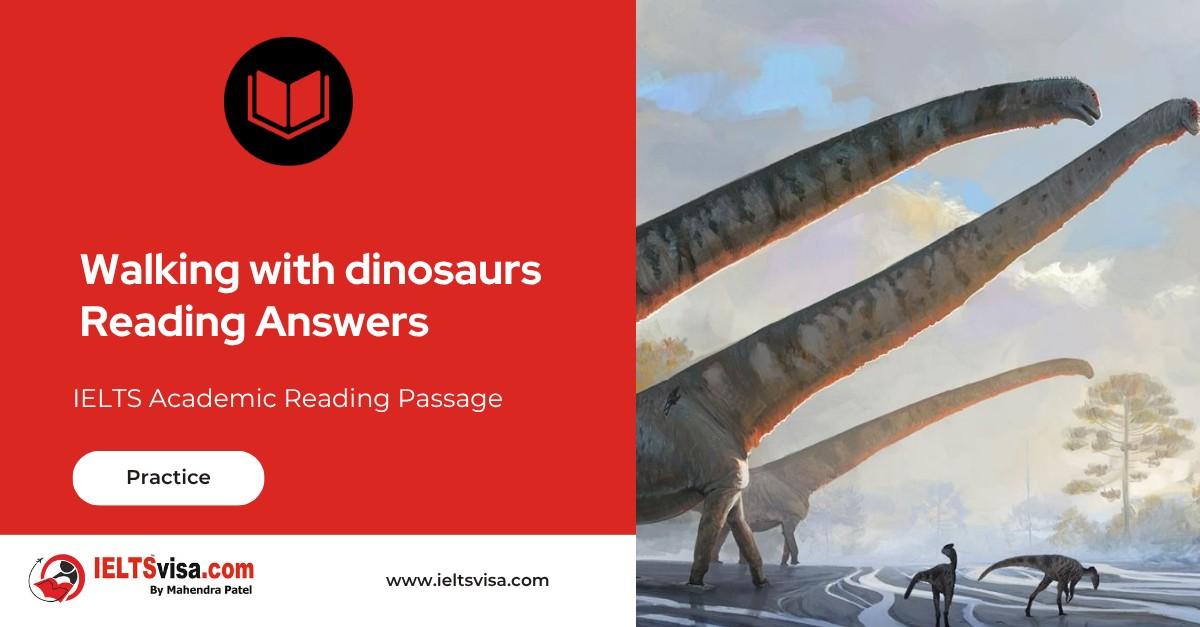Why Being Bored is Stimulating and Useful Too Reading Answers
IELTS Academic Reading Passage
This most common of emotions is turning out to be more interesting than we thought
A We all know how it feels – it’s impossible to keep your mind on anything, time stretches out, and all the things you could do seem equally unlikely to make you feel better. But defining boredom so that it can be studied in the lab has proved difficult. For a start, it can include a lot of other mental states, such as frustration, apathy, depression and indifference. There isn’t even agreement over whether boredom is always a low-energy, flat kind of emotion or whether feeling agitated and restless counts as boredom, too. In his book, Boredom: A Lively History, Peter Toohey at the University of Calgary, Canada, compares it to disgust – an emotion that motivates us to stay away from certain situations. ‘If disgust protects humans from infection, boredom may protect them from “infectious” social situations, he suggests.
B By asking people about their experiences of boredom, Thomas Goetz and his team at the University of Konstanz in Germany have recently identified five distinct types: indifferent, calibrating, searching, reactant and apathetic. These can be plotted on two axes – one running left to right, which measures low to high arousal, and the other from top to bottom, which measures how positive or negative the feeling is. Intriguingly, Goetz has found that while people experience all kinds of boredom, they tend to specialise in one. Of the five types, the most damaging is ‘reactant’ boredom with its explosive combination of high arousal and negative emotion. The most useful is what Goetz calls ‘indifferent’ boredom: someone isn’t engaged in anything satisfying but still feels relaxed and calm. However, it remains to be seen whether there are any character traits that predict the kind of boredom each of us might be prone to.
C Psychologist Sandi Mann at the University of Central Lancashire, UK, goes further. ‘All emotions are there for a reason, including boredom, she says. Mann has found that being bored makes us more creative. ‘We’re all afraid of being bored but in actual fact it can lead to all kinds of amazing things, she says. In experiments published last year, Mann found that people who had been made to feel bored by copying numbers out of the phone book for 15 minutes came up with more creative ideas about how to use a polystyrene cup than a control group. Mann concluded that a passive, boring activity is best for creativity because it allows the mind to wander. In fact, she goes so far as to suggest that we should seek out more boredom in our lives.
D Psychologist John Eastwood at York University in Toronto, Canada, isn’t convinced. ‘If you are in a state of mind-wandering you are not bored, he says. ‘In my view, by definition boredom is an undesirable state’. That doesn’t necessarily mean that it isn’t adaptive, he adds. ‘Pain is adaptive – if we didn’t have physical pain, bad things would happen to us. Does that mean that we should actively cause pain? No. But even if boredom has evolved to help us survive, it can still be toxic if allowed to fester. For Eastwood, the central feature of boredom is a failure to put our ‘attention system’ into gear. This causes an inability to focus on anything, which makes time seem to go painfully slowly. What’s more, your efforts to improve the situation can end up making you feel worse. ‘People try to connect with the world and if they are not successful there’s that frustration and irritability, he says. Perhaps most worryingly, says Eastwood, repeatedly failing to engage attention can lead to state where we don’t know what to do any more, and no longer care.
E Eastwood’s team is now trying to explore why the attention system fails. It’s early days but they think that at least some of it comes down to personality. Boredom proneness has been linked with a variety of traits. People who are motivated by pleasure seem to suffer particularly badly. Other personality traits, such as curiosity, are associated with a high boredom threshold. More evidence that boredom has detrimental effects comes from studies of people who are more or less prone to boredom. It seems those who bore easily face poorer prospects in education, their career and even life in general. But of course, boredom itself cannot kill – it’s the things we do to deal with it that may put us in danger. What can we do to alleviate it before it comes to that? Goetz’s group has one suggestion. Working with teenagers, they found that those who ‘approach’ a boring situation – in other words, see that it’s boring and get stuck in anyway – report less boredom than those who try to avoid it by using snacks, TV or social media for distraction.
F Psychologist Francoise Wemelsfelder speculates that our over-connected lifestyles might even be a new source of boredom. ‘In modern human society there is a lot of overstimulation but still a lot of problems finding meaning, she says. So instead of seeking yet more mental stimulation, perhaps we should leave our phones alone, and use boredom to motivate us to engage with the world in a more meaningful way.
Questions 14-19
The Reading Passage has six paragraphs, A-F.
Choose the correct heading for each paragraph from the list of headings below.
Write the correct number, i-viii, in boxes 14-19 on your answer sheet.
List of Headings
i The productive outcomes that may result from boredom
ii ‘What teachers can do to prevent boredom
iii A new explanation and a new cure for boredom
iv Problems with a scientific approach to boredom
v A potential danger arising from boredom
vi Creating a system of classification for feelings of boredom
vii Age groups most affected by boredom
viii Identifying those most affected by boredom
14 Paragraph A
15 Paragraph B
16 Paragraph C
17 Paragraph D
18 Paragraph E
19 Paragraph F
Questions 20-23
Look at the following people (Questions 20-23) and the list of ideas below.
Match each person with the correct idea, A-E.
Write the correct letter, A-E, in boxes 20-23 on your answer sheet.
20 Peter Toohey
21 Thomas Goetz
22 John Eastwood
23 Francoise Wemelsfelder
List of Ideas
A The way we live today may encourage boredom.
B One sort of boredom is worse than all the others.
C Levels of boredom may fall in the future.
D Trying to cope with boredom can increase its negative effects.
E Boredom may encourage us to avoid an unpleasant experience.
Questions 24-26
Complete the summary below.
Choose ONE WORD ONLY from the passage for each answer.
Write your answers in boxes 24-26 on your answer sheet.
Responses to boredom
For John Eastwood, the central feature of boredom is that people cannot 24……………… due to a failure in what he calls the ‘attention system), and as a result they become frustrated and irritable. His team suggests that those for whom 25……………….. is an important aim in life may have problems in coping with boredom, whereas those who have the characteristic of 26………….. can generally cope with it.

Solution For: Why Being Bored is Stimulating and Useful Too
Reading Answers
| 14 – iv | 21 – B |
| 15 – vi | 22 – D |
| 16 – i | 23 – A |
| 17 – v | 24 – focus |
| 18 – viii | 25 – pleasure |
| 19 – iii | 26 – curiosity |
| 20 – E |
Review and Practice
- Regularly practice with IELTS reading samples and time yourself to get used to the pressure of the exam.
- Review your mistakes to understand where you went wrong and how to avoid similar errors in the future.
Our Books
Master IELTS Speaking Part 1
IELTS Writing Task 1 Book
IELTS Writing Task 2 Book
Why Being Bored is Stimulating and Useful Too Reading Answers Explanation
Comin Soon
Practice IELTS Other Modules
IELTS Listening
The IELTS Listening test assesses how well you can understand spoken English in various contexts. It lasts about 30 minutes and is divided into four sections with a total of 40 questions. The listening tasks become increasingly difficult as the test progresses.
IELTS Academic Reading
The IELTS Academic Reading section assesses your ability to understand and interpret a variety of texts in academic settings. It is designed to evaluate a range of reading skills, including skimming for gist, reading for main ideas, reading for detail, understanding inferences, and recognizing a writer's opinions and arguments.
IELTS Speaking
The IELTS Speaking test assesses your ability to communicate in English on everyday topics. It lasts 11-14 minutes and consists of three parts: introduction, cue card, and a discussion based on the cue card topic.
IELTS General Reading
IELTS General Reading tests your ability to understand and interpret various types of texts. Here are some key areas and types of content you can expect to encounter in the reading section, along with tips for effective preparation.
IELTS Academic Writing Task 1
In IELTS Academic Writing Task 1, you are presented with a visual representation of information, such as graphs, charts, tables, or diagrams, and you are required to summarize, compare, or explain the data in your own words.
IELTS General Writing Task 1
In IELTS General Writing Task 1, you are required to write a letter based on a given situation. The letter can be formal, semi-formal, or informal, depending on the prompt. Here’s a breakdown of the key components to include in your letter
IELTS Academic Writing Task 2
In IELTS Academic Writing Task 2, you are required to write an essay in response to a question or topic. Here’s a guide to help you understand the essential elements of this task
IELTS Exam Tips
To succeed in the IELTS exam, practice regularly, familiarize yourself with the test format, improve your vocabulary, develop time management skills, and take mock tests to build confidence.
Grammer for IELTS
Grammar is the foundation of effective communication in English. Understanding tense usage, subject-verb agreement, and sentence structure enhances clarity and coherence in writing and speaking.
Vocabulary for IELTS
Vocabulary plays a crucial role in the IELTS (International English Language Testing System) exam, especially in the Speaking and Writing sections. Here’s an overview of why vocabulary is important and how it impacts your performance
RECENT IELTS SAMPLES QUESTIONS AND ANSWERS
Walking with dinosaurs
Peter L. Falkingham and his colleagues at Manchester University are developing techniques that...
Money as the Unit of Amount Reading Answers
The most difficult aspect of money to understand is its function as a unit of account. In...
WEATHERING IN THE DESERT
In the deserts, as elsewhere, rocks at the earth's surface are changed by weathering, which...
Nature on Display in American Zoos
The first zoo in the United States opened in Philadelphia in 1874, followed by the Cincinnati...
Can We Prevent the Poles From Melting
Such is our dependence on fossil fuels, and such is the volume of carbon dioxide we have...
Air conditioning the earth reading answers
The circulation of air in the atmosphere is activated by convection, the transference of heat...













